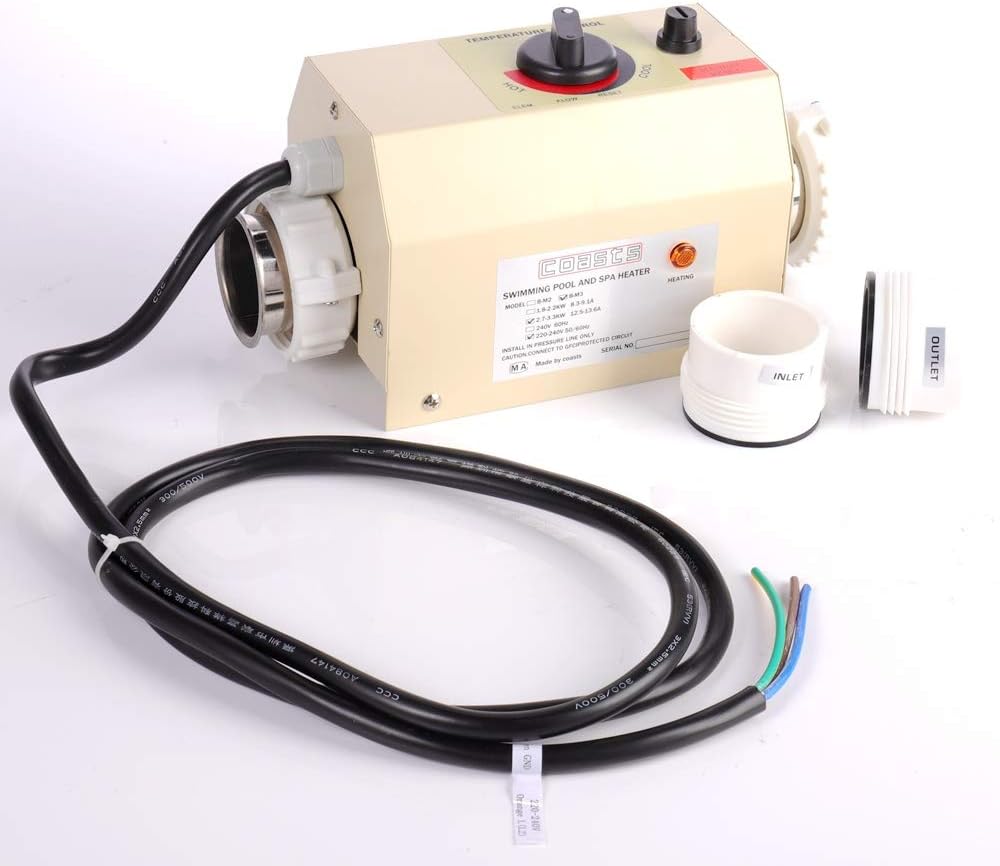Discover the benefits of sweatbands for your fitness routine. Enhance your performance and stay comfortable with these stylish and functional accessories.


Welcome to our comprehensive guide on electric pool heaters. If you’re a pool owner looking for an efficient and cost-effective way to heat your pool, electric pool heaters are an excellent choice. In this guide, we will cover everything you need to know about electric pool heaters, including how they work, their benefits, different types, installation, maintenance, and more. Let’s dive in!
Electric pool heaters work by using electricity to generate heat, which is then transferred to the pool water. They consist of a heating element, typically made of a metal alloy, that heats up when an electric current passes through it. The heated element warms the water as it flows through the heater, and the warm water is then returned to the pool.
Electric pool heaters are designed to maintain a desired water temperature by continuously heating the water as it circulates through the system. They are controlled by a thermostat that allows you to set the desired temperature and maintain it throughout the swimming season.
There are several benefits to using electric pool heaters:
Electric pool heaters are known for their energy efficiency. They convert almost all the electricity they consume into heat, making them a cost-effective option in the long run. Additionally, electric pool heaters can be powered by renewable energy sources, such as solar panels, further reducing their environmental impact.
Electric pool heaters heat up the water quickly, allowing you to enjoy your pool even on cooler days. Unlike solar pool heaters, which rely on sunlight, electric heaters can provide consistent heating regardless of the weather conditions.
Electric pool heaters are compact in size and can be easily installed in any pool setup. They don’t require any additional equipment or complex plumbing, making them a convenient choice for both new and existing pools.
Electric pool heaters offer precise temperature control, allowing you to set and maintain the desired water temperature. This feature is particularly useful if you have specific temperature preferences or if you want to ensure a comfortable swimming experience for everyone.
Compared to other types of pool heaters, electric pool heaters require minimal maintenance. They don’t have any moving parts that can wear out or require regular servicing, making them a hassle-free option for pool owners.

There are two main types of electric pool heaters:
Electric resistance heaters are the most common type of electric heaters. They work by passing an electric current through a heating element, which then generates heat. The heated element warms the water as it flows through the heater, and the warm water is returned to the pool. Electric resistance heaters are known for their efficiency and ability to provide consistent heating.
Heat pumps are another type of pool heater that uses electricity to transfer heat from the surrounding air or ground to the pool water. They work similarly to air conditioners but in reverse. Heat pumps are highly energy-efficient and can provide heating even in colder climates. However, they tend to be more expensive upfront compared to electric resistance heaters.
When choosing an electric pool heater, there are several factors to consider:
The size of your pool is an important consideration when selecting an electric heater. The heater must be able to provide enough heat to raise the water temperature to the desired level. It’s recommended to consult with a pool professional to determine the appropriate heater size for your pool.
Look for electric pool heaters with high energy efficiency ratings. This will ensure that you get the most out of your investment and minimize your energy consumption. Energy-efficient heaters can help you save on utility bills and reduce your environmental footprint.
Consider the installation requirements of the electric pool heater. Some heaters may require additional equipment or modifications to your pool setup, while others can be easily installed without any major changes. Choose a heater that suits your installation preferences and budget.
Set a budget for your electric pool heater purchase. The cost of pool heaters can vary depending on the brand, size, and features. Consider your budget and choose a heater that offers the best value for your money.

Installing an electric pool heater is a straightforward process that can be done by a professional or a knowledgeable DIY enthusiast. Here are the general steps involved in the installation:
Choose a suitable location for the heater that allows for easy access and proper ventilation. The heater should be installed near the pool equipment area to minimize plumbing and electrical connections.
Clean and level the area where the heater will be installed. Make sure there is enough space for the heater and any required additional equipment, such as electrical wiring and plumbing connections.
Connect the plumbing lines to the heater according to the manufacturer’s instructions. This may involve cutting and joining PVC pipes or using flexible hoses, depending on your pool setup.
Hire a licensed electrician to connect the electrical wiring for the heater. This ensures that the installation meets safety standards and prevents any potential electrical hazards.
Once the installation is complete, test the heater to ensure it is functioning properly. Adjust the temperature settings according to your preferences and make any necessary adjustments to the water flow.
Maintaining an electric pool heater is relatively simple. Here are some tips to keep your heater in optimal condition:
Clean the heating element and other components of the heater regularly to remove any debris or mineral buildup. This will ensure efficient heat transfer and prevent any potential damage to the heater.
Inspect the plumbing connections and the heater for any leaks. If you notice any leaks, address them promptly to prevent water damage and maintain the efficiency of the heater.
Consider scheduling professional maintenance for your electric heater. A qualified technician can perform a thorough inspection, clean the internal components, and identify any potential issues before they become major problems.
To maximize the efficiency of your electric pool heater, follow these tips:
Using a pool cover when the pool is not in use can help retain heat and reduce heat loss. This will reduce the workload on the heater and save energy.
Avoid setting the water temperature higher than necessary. Every degree increase in temperature requires more energy, so find a comfortable temperature that suits your needs without excessive energy consumption.
Program your heater to operate during off-peak hours when electricity rates are lower. This can help save on energy costs, especially if you have time-of-use pricing.

The lifespan of an electric heater can vary depending on the brand, usage, and maintenance. On average, electric pool heaters can last between 5 to 10 years.
While it is possible to install an electric heater yourself, it is recommended to hire a professional for the installation. This ensures that the installation is done correctly and safely.
Electric pool heaters are available in different sizes to accommodate various pool sizes. It’s important to choose a heater that is appropriately sized for your pool to ensure efficient and effective heating.
Electric pool heaters can be used for hot tubs, but it’s important to ensure that the heater is compatible with the hot tub’s size and water volume. Consult with a professional to determine the right heater for your hot tub.
Electric pool heaters can provide heating in cold climates, but their effectiveness may be reduced in extremely low temperatures. In such cases, you may need additional heating sources or consider alternative options, such as heat pumps or gas heaters.
– Energy efficient: pool heaters convert almost all the electricity they consume into heat, making them a cost-effective option in the long run. They can also be powered by renewable energy sources.
– Quick heating: Electric pool heaters heat up the water quickly, allowing you to enjoy your pool even on cooler days.
– Compact and easy to install: Electric heaters are compact in size and can be easily installed in any pool setup. They don’t require any additional equipment or complex plumbing.
– Precise temperature control: Electric heaters offer precise temperature control, allowing you to set and maintain the desired water temperature.
– Low maintenance: Electric pool heaters require minimal maintenance as they don’t have any moving parts that can wear out or require servicing.
– Higher operating costs: Electric heaters may have higher operating costs compared to other types of pool heaters, such as gas heaters.
– Limited effectiveness in extremely cold temperatures: pool heaters may be less effective in extremely cold temperatures and may require additional heating sources in such cases.

Overall, electric pool heaters are a reliable and efficient option for heating your pool, providing quick heating, precise temperature control, and low maintenance requirements. While they may have higher operating costs, their energy efficiency and ease of installation make them a popular choice among pool owners.